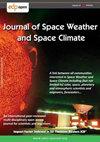A Bayesian approach to the drag-based modelling of ICMEs
IF 2.7
2区 物理与天体物理
Q2 ASTRONOMY & ASTROPHYSICS
引用次数: 1
Abstract
Coronal Mass Ejections (CMEs) are huge clouds of magnetised plasma expelled from the solar corona that can travel towards the Earth and cause significant space weather effects. The Drag-Based Model (DBM) describes the propagation of CMEs in an ambient solar wind as analogous to an aerodynamic drag. The drag-based approximation is popular because it is a simple analytical model that depends only on two parameters, the drag parameter $\gamma$ and the solar wind speed $w$. DBM thus allows us to obtain reliable estimates of CME transit time at low computational cost. Previous works proposed a probabilistic version of DBM, the Probabilistic Drag Based Model (P-DBM), which enables the evaluation of the uncertainties associated with the predictions. In this work, we infer the "a-posteriori" probability distribution functions (PDFs) of the $\gamma$ and $w$ parameters of the DBM by exploiting a well-established Bayesian inference technique: the Monte Carlo Markov Chains (MCMC) method. By utilizing this Bayesian method through two different approaches, an ensemble and an individual approach, we obtain specific DBM parameter PDFs for two ensembles of CMEs: those travelling with fast and slow solar wind, respectively. Subsequently, we assess the operational applicability of the model by forecasting the arrival time of CMEs. While the ensemble approach displays notable limitations, the individual approach yields promising results, demonstrating competitive performances compared to the current state-of-the-art, with a mean absolute error (MAE) of 9.86 ± 4.07 hours achieved in the best-case scenario.用贝叶斯方法建立基于阻力的国际集成流体动力学模型
日冕物质抛射(CMEs)是从日冕中排出的巨大磁化等离子体云,可向地球传播并造成严重的空间天气影响。 基于阻力的模型(DBM)将日冕物质抛射在环境太阳风中的传播描述为类似于空气动力阻力。基于阻力的近似值很受欢迎,因为它是一个简单的分析模型,只取决于两个参数:阻力参数 $\gamma$ 和太阳风速度 $w$。因此,DBM允许我们以较低的计算成本获得对CME过境时间的可靠估计。 之前的工作提出了DBM的概率版本,即基于阻力的概率模型(P-DBM),它可以评估与预测相关的不确定性。 在这项工作中,我们利用成熟的贝叶斯推理技术:蒙特卡罗马尔可夫链(MCMC)方法,推断出了 DBM 的 $\gamma$ 和 $w$ 参数的 "后验 "概率分布函数(PDF)。 通过两种不同的方法--集合方法和个体方法--利用这种贝叶斯方法,我们得到了两个集合 CME 的特定 DBM 参数 PDF:分别是随快太阳风和慢太阳风移动的 CME。 随后,我们通过预测 CME 的到达时间来评估模型的实用性。 虽然集合方法显示出明显的局限性,但单个方法却产生了可喜的结果,与目前最先进的方法相比,显示出具有竞争力的性能,在最佳情况下,平均绝对误差(MAE)为 9.86 ± 4.07 小时。
本文章由计算机程序翻译,如有差异,请以英文原文为准。
求助全文
约1分钟内获得全文
求助全文
来源期刊

Journal of Space Weather and Space Climate
ASTRONOMY & ASTROPHYSICS-GEOCHEMISTRY & GEOPHYSICS
CiteScore
6.90
自引率
6.10%
发文量
40
审稿时长
8 weeks
期刊介绍:
The Journal of Space Weather and Space Climate (SWSC) is an international multi-disciplinary and interdisciplinary peer-reviewed open access journal which publishes papers on all aspects of space weather and space climate from a broad range of scientific and technical fields including solar physics, space plasma physics, aeronomy, planetology, radio science, geophysics, biology, medicine, astronautics, aeronautics, electrical engineering, meteorology, climatology, mathematics, economy, informatics.
 求助内容:
求助内容: 应助结果提醒方式:
应助结果提醒方式:


